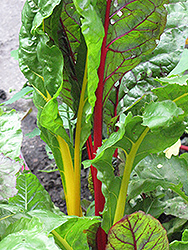Bright Lights Swiss Chard
Beta vulgaris 'Bright Lights'
Height: 24 inches
Spread: 18 inches
Sunlight:
![]()
![]()
Hardiness Zone: (annual)
Group/Class: Cicla Group
Description:
Closely related to beets, this variety is excellent for both ornamental and culinary purposes; arching, crinkled green leaves are supported by leaf stalks of red, yellow, orange, and white, create a colorful edging; leaves and stalks are great for salads
Edible Qualities
Bright Lights Swiss Chard is an annual vegetable plant that is typically grown for its edible qualities, although it does have ornamental merits as well. The entire above-ground parts of the plant are edible, and are usually harvested from early to late summer. The edible parts have a mild taste and a crisp texture.
The plant is most often used in the following ways:
- Fresh Eating
- Cooking
Planting & Growing
Bright Lights Swiss Chard will grow to be about 24 inches tall at maturity, with a spread of 18 inches. This fast-growing vegetable plant is an annual, which means that it will grow for one season in your garden and then die after producing a crop. Because of its relatively short time to maturity, it lends itself to a series of successive plantings each staggered by a week or two; this will prolong the effective harvest period.
This plant is quite ornamental as well as edible, and is as much at home in a landscape or flower garden as it is in a designated vegetable garden. It does best in full sun to partial shade. It does best in average to evenly moist conditions, but will not tolerate standing water. It is not particular as to soil pH, but grows best in rich soils. It is somewhat tolerant of urban pollution. This is a selected variety of a species not originally from North America.
Bright Lights Swiss Chard is a good choice for the vegetable garden, but it is also well-suited for use in outdoor pots and containers. It can be used either as 'filler' or as a 'thriller' in the 'spiller-thriller-filler' container combination, depending on the height and form of the other plants used in the container planting. It is even sizeable enough that it can be grown alone in a suitable container. Note that when growing plants in outdoor containers and baskets, they may require more frequent waterings than they would in the yard or garden.
